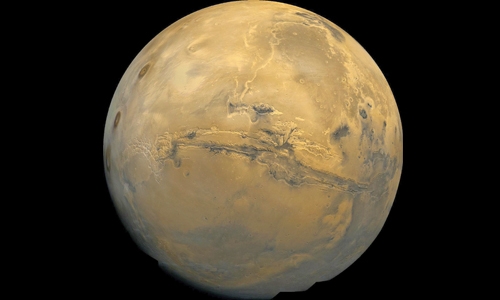Mars study offers clues to origin of life on Earth
Washington : Nasa scientists have discovered evidence for ancient sea-floor hydrothermal deposits on Mars which may offer clues about the origin of life on Earth.
Researchers examined observations by Nasa’s Mars Reconnaissance Orbiter (MRO) of massive deposits in a basin on southern Mars.
They interpret the data as evidence that these deposits were formed by heated water from a volcanically active part of the planet’s crust entering the bottom of a large sea long ago.
“Even if we never find evidence that there has been life on Mars, this site can tell us about the type of environment where life may have begun on Earth,” said Paul Niles of NASA’s Johnson Space Center in the US.
“Volcanic activity combined with standing water provided conditions that were likely similar to conditions that existed on Earth at about the same time - when early life was evolving here,” said Niles, co-author of the research published in the journal Nature Communications.
Mars today has neither standing water nor volcanic activity. Researchers estimate an age of about 3.7 billion years for the martian deposits attributed to seafloor hydrothermal activity.
Undersea hydrothermal conditions on Earth at about that same time are a strong candidate for where and when life on Earth began, researchers said.
Earth still has such conditions, where many forms of life thrive on chemical energy extracted from rocks, without sunlight, they said.
However, due to Earth’s active crust, our planet holds little direct geological evidence preserved from the time when life began.
Related Posts

